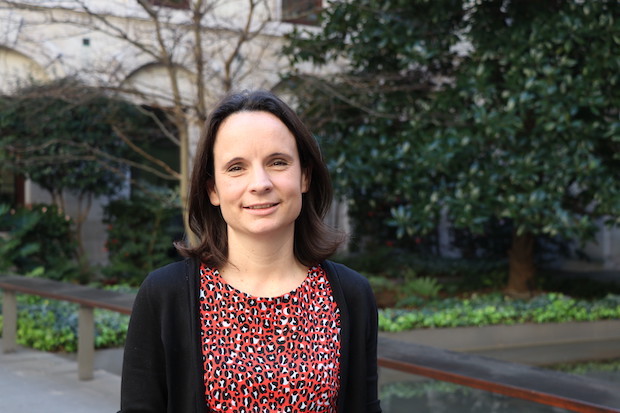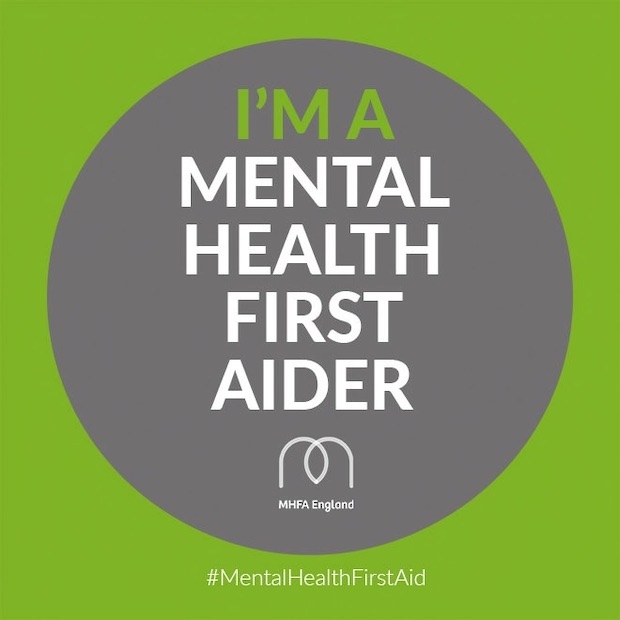
My young daughter came home from school yesterday with a massive hole in her thick blue tights, with some pink bloodied skin poking through. I asked what had happened, and listened sympathetically as she explained how the game of “the floor is lava” had gotten out of hand.
I showed her where the first aid kit was, and how its contents could help with different injuries. And we talked about what she might do (or not do) to help her deal with the injury, and help it get better. She was delighted to get out of bath-time.
First aid in action
Just as we have physical health we have mental health. And like we have physical first aiders, we also have mental health first aiders.
I’m one of them. There are around 150 of us in the Cabinet Office, and many more across the Civil Service.
Trained to listen
A bit like my example of giving physical first aid to my daughter, our role as a Mental Health First Aider is to be available for, and look out for those with mental health issues.
We are trained to listen and reassure in a non-judgemental way to your concerns. Many of us have lived experience of mental health, either our own or of loved ones, and will do our best to empathise with your situation. We will also signpost professional support if it's needed - a bit like a physical first aid kit - and will always treat your conversion as confidential.
Confidential support service

Mental Health First Aiders will offer their support in a number of ways and this will inevitably vary across organisations.
Check out your departmental intranet to find out what is available to you. They may offer a confidential support service, promote good wellbeing through events and newsletters, group discussions to develop peer support in an organisation, as well as looking out for those around them who may need help.
Reduce stigma
Above all, their actions help to normalise mental ill health and reduce the stigma that remains present.
We do all of this in the Cabinet Office, and are always looking to build on best practice across our network, so our Mental Health First Aiders are fully supported and visible, meaning that they’re better able to support our colleagues.
Feeling low
The range of mental health issues we encounter can be considerable. It can be an individual who is feeling low and finding it hard to stay motivated at work. Someone else might be grieving and finding it difficult to see light at the end of a very dark tunnel. Another person may be in crisis with thoughts of ending their own life.
Massive difference
Of course, some of these conversations can be distressing, and in a crisis situation, we are obliged to call on professionals if an individual appears to be in immediate danger. We are not medical professionals ourselves, but we don’t shy away from these situations because we know that our support can make a massive difference to an individual’s life.
Look after our wellbeing
It’s really important that as Mental Health First Aiders, we look after our own wellbeing as a priority to ensure that we are in the best position to support others.
My plea to readers is that you make mental health as important as your physical health.
This means focussing on both prevention (exploring the actions you need to take to support good mental health, like Mind’s 5 ways to wellbeing) and treatment. This includes creating your own mental health first aid kit, of which I hope Mental Health First Aiders are an important part!

7 comments
Comment by Julie Conneely posted on
thank you for your article, I love this and I feel this is the way I work as an MHFA.
In the same way when children are in school for the majority of accidents, bumps and scrapes, the first thing that schools & parents offer is a cold compress and (social distance prevailing) a hug.
It is often the feeling of being acknowledged and someone responding to the hurt that allows after the appropriate time (usually very short period of time) to get back on our way and even maybe start skipping.
I am not saying this to trivialise what we as MHFA's do, but it is quite often that initial conversation or check in, How are you today?, no really, how are you ? That in many cases is the cold compress, it quite often helps in the same way of being heard and acknowledged.
In the same spirit of first aid, we can also identify where more support is required or indeed where immediate or emergency help is required. We may not have a green case with a white cross but we do have our own 1st aid kit and our own particular tools and signposts and referrals we can use in place of sticking plasters.
Comment by Boutique musulmane en ligne Razva posted on
It is an interesting subject. Thank you
<p><a href="https://razva.com/1399/09/comment-mesurer-sa-taille-de-bague/?lang=fr">Taille de bague</a></p>
Comment by Christopher Hopkins posted on
Can you promote other course other than MHFA England course. The MHFA England course is not an accredited course. Where as The First Aid For Mental Health course is accredited and fully regulated by ofqual.
Comment by Hazel O'Neil posted on
Love this! Thank you for sharing!
Comment by Shuhab Hamid posted on
Thank you Alexandra for a great blog, good timing with the festive season nearby. Lets look after both our #mental & #physical health into the new year.
Comment by Gavin Thomas posted on
Thank you Alexandra on sharing with us your personal reflections and for promoting the role of a Mental Health First Aider.
As the one of the Co Chairs of the FCDO Mental Health, Wellbeing and Listening Network, I have been encouraged with the change in attitude and focus concerning mental health.
Also as a Mental Health First Aider, I have been pleased to hear from colleagues that this resources has been seen as invaluable.
In addition to the points that you have made, for me one of the key aims has been to normalise the conversation around mental health.
I would certainly agree with you that it is important that as a MHFA, we look to have in place safeguards to manage our own wellbeing.
Comment by Sam Edwards posted on
What a great article. I left it a bit longer than I should have to seek help. Luckily I have a brilliant team, the support I now have is making a difference and helping me to navigate my mental heath and my menopause.